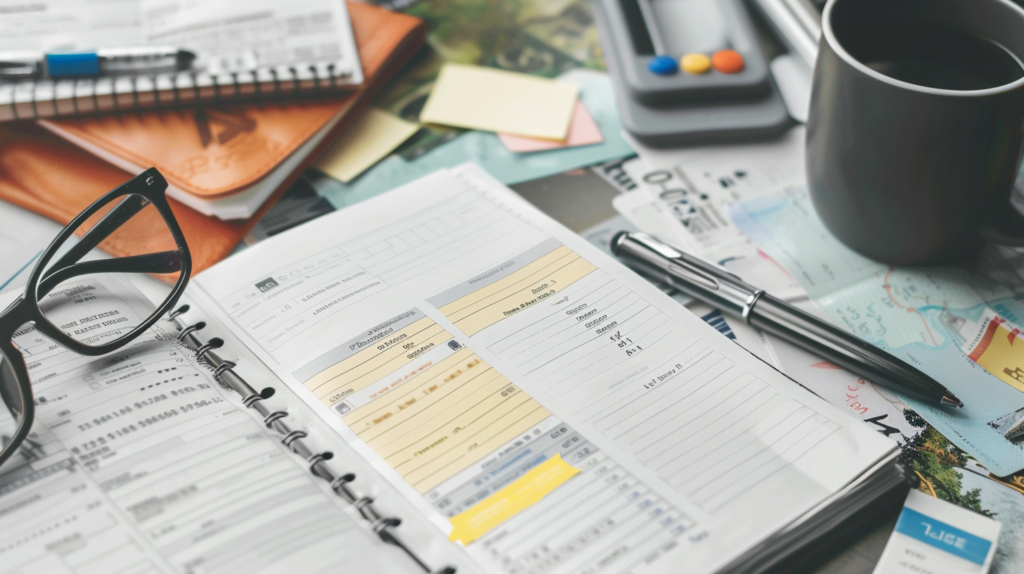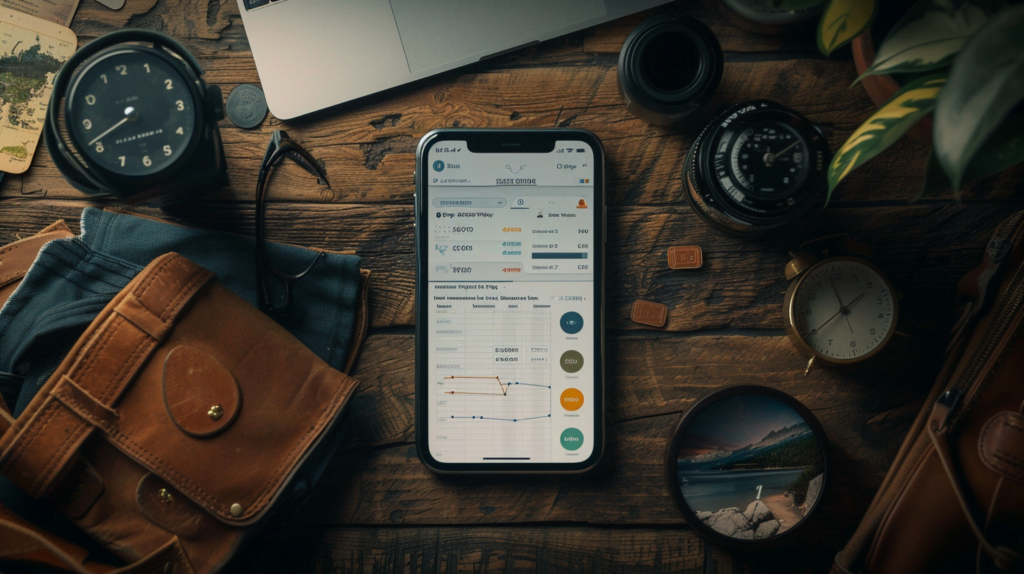
Welcome to EcoNomadic Wanderer, Personal Finance Tips for New Digital Nomads are essential for anyone embarking on the journey of combining work and travel. As a digital nomad, the freedom to explore the world while maintaining a career is exhilarating, but it also introduces unique financial challenges. Balancing income, expenses, and savings while navigating different countries and cultures requires careful planning and strategic thinking.
- Introduction
- Personal Finance Tips #1. Formulate a Travel Budget
- Personal Finance Tips #2. Optimize Your Income Sources
- Personal Finance Tips #3. Leverage Technology for Financial Management
- Personal Finance Tips #4. Smart Investment Strategies and Financial Discipline
- Personal Finance Tips #5. Tax Management
- Conclusion
Introduction
Envision waking up in a new metropolis every few months, conducting work from a beachside café in Bali, or attending virtual meetings from a quaint apartment in Paris. Such is the idyllic life many digital nomads aspire to. However, without judicious financial management, this dream can swiftly devolve into a stressful quandary. With fluctuating living costs, currency exchanges, and unforeseen travel expenses, managing personal finances on the move necessitates a proactive approach.
In this guide, we delve into My Top 5 Personal Finance Tips for New Digital Nomads Traveling Around the World. These strategies aim to help you establish a robust financial foundation, optimize income streams, leverage technological tools, make astute investments, and efficiently manage taxes. By adhering to these principles, you can sustain and thrive in your nomadic lifestyle. Let’s embark on this journey to financial empowerment and security.
Personal Finance Tips #1. Formulate a Travel Budget

A meticulously crafted travel budget is the linchpin of financial management for digital nomads. It helps track spending, curtail unnecessary expenses, and ensures sufficient funds to sustain your lifestyle. Here’s how to create an effective travel budget:
Enumerate All Potential Expenses
Begin by identifying all potential expenditures you might encounter during your travels. These include:
- Accommodation: Assess the cost of living in your destination, whether for short-term stays in hostels via AGODA or longer-term rentals through Airbnb.
- Transportation: Account for flights, trains, buses, and local transportation. Utilize platforms like Skyscanner and Rome2Rio to find optimal deals.
- Food: Budget for daily meals, encompassing dining out and grocery shopping. Apps like Yelp can assist in discovering affordable dining options. Local markets and street food stalls offer authentic cuisine at lower costs, such as night markets in Taiwan or food stalls in Thailand.
- Activities: Allocate funds for sightseeing, excursions, and entertainment from Klook.
- Insurance: Secure comprehensive travel and health insurance from providers like World Nomads.
- Emergency Fund: Set aside funds for unexpected expenses like medical emergencies or sudden travel changes.
Monitor Your Expenses
Employ budgeting apps like Rocket Money, Quicken Simplifi or YNAB (You Need a Budget) to track expenses in real-time. These tools help categorize spending, set financial goals, and adjust budgets as necessary. For example, if you overspend on dining out, you can compensate by reducing entertainment expenses the following month.
Prepare for Unexpected Costs
Travel can be unpredictable, making it crucial to maintain a financial cushion. Aim to save an emergency fund equivalent to at least three months of living expenses to cover unexpected medical bills, emergency flights, or temporary accommodations if plans change abruptly.
Personal Finance Tips #2. Optimize Your Income Sources

Freelancing and Remote Work
Freelancing and remote work are primary income sources for digital nomads. Platforms like Upwork, Fiverr, and Freelancer offer numerous opportunities to work remotely. Ensure a steady stream of projects or clients to maintain consistent income.
Passive Income Streams
Investing in Stocks, Bonds, and Real Estate
Utilize platforms like Moomoo, Acorns or Robinhood to invest in stocks, bonds, and mutual funds, generating dividend income and capital gains. Investing in rental properties or Real Estate Investment Trusts (REITs) can also provide rental income.
Creating and Selling Digital Products
Create and sell digital products such as eBooks, online courses, or printables. Platforms like Teachable, Udemy, and Etsy facilitate reaching a global audience. For instance, if you have expertise in a particular field, you can create an online course and earn passive income from enrollments.
Starting a Digital Nomad Lifestyle Blog
Starting a blog about your digital nomad experiences can be both rewarding and lucrative. Here’s how to get started:
- Choose a Niche: Focus on a specific aspect of the digital nomad lifestyle, such as budget travel, remote work tips, or destination guides.
- Set Up Your Blog: Use platforms like WordPress, Wix or Squarespace to create your blog. Invest in a professional domain name and reliable hosting service.
- Create Quality Content: Write engaging, informative posts that offer value to readers. Use high-quality images and optimize content for SEO to attract organic traffic.
- Monetize Your Blog: Once you have a steady stream of visitors, monetize your blog through:
- Affiliate Marketing: Promote travel and remote work-related products or services. Join affiliate programs like Amazon Associates or ShareASale to earn commissions on sales through your referral links.
- Sponsored Posts: Partner with brands for sponsored content, including reviews, product placements, or travel experiences.
- Ad Revenue: Display ads on your blog using networks like Google AdSense, earning money based on ad impressions or clicks.
Diversifying income streams can create a stable financial foundation, allowing you to enjoy the digital nomad lifestyle without financial anxiety.
Personal Finance Tips #3. Leverage Technology for Financial Management

Technology is a valuable ally for digital nomads managing finances. Here’s how to utilize various tools and services:
Banking and Currency Exchange
Open multi-currency accounts with digital banks like Revolut or Wise to avoid high conversion fees and ATM charges. These banks offer real-time exchange rates and low-cost international transfers, saving significant amounts over time.
Expense Management Apps
Use apps like TravelSpend, XE Currency and TrabeePocket to track expenses across different currencies and countries. These apps help categorize expenses, set budgets, and generate reports.
Travel Credit Cards
Travel credit cards like Chase Sapphire Preferred and Capital One Venture X offer numerous benefits, including no foreign transaction fees, travel insurance, and reward points redeemable for travel expenses. For instance, Chase Sapphire Preferred provides double points on travel and dining, while Capital One Venture X offers 2x miles on every purchase and 10x miles on hotels and rentals through Capital One Travel Portal.
Personal Finance Tips #4. Smart Investment Strategies and Financial Discipline

Diversify Your Portfolio
Diversifying your investment portfolio protects against market volatility. Allocate investments across stocks, bonds, and real estate. Platforms like Acorns, Stash or Robinhood offer automated investment services to help diversify efficiently.
Cryptocurrency Investments
Cryptocurrencies can be lucrative if managed wisely. Use platforms like Coinbase or Binance to trade and invest in digital currencies. Thorough research and understanding of risks are essential.
Set Financial Goals
Setting short-term and long-term financial goals keeps you focused and motivated. Whether saving for a trip, investing in property, or building a retirement fund, clear goals provide direction.
Regular Financial Reviews
Regularly review your financial status to assess progress and make adjustments. Revisit budgets, evaluate income sources, and monitor investments.
Personal Finance Tips #5. Tax Management

Understanding and managing tax obligations as a digital nomad can be complex. Here’s how to navigate it:
Understand Tax Obligations
Tax laws vary across countries. Understanding obligations and seeking advice from tax professionals, such as Nomad Tax, is crucial. Some countries may require taxes after a certain period, while others have specific regulations for foreign-earned income.
Keep Accurate Records
Maintain accurate records of income, expenses, and investments using accounting software like QuickBooks or Xero. This simplifies tax filing and helps identify potential deductions and credits.
Tax Benefits of Travel Credit Cards
Travel credit cards like Chase Sapphire Preferred and Capital One Venture X provide detailed statements categorizing expenses, aiding in tracking deductible travel expenses for tax purposes. Separating personal and business expenses ensures clear documentation for deductions related to travel, dining, and accommodations.
Conclusion
Managing personal finances while exploring the world requires discipline, strategic planning, and a proactive approach. By formulating a detailed budget, optimizing income sources, leveraging technology, investing wisely, and understanding tax obligations, you can achieve financial stability and fully enjoy the digital nomad lifestyle.
#Embrace these strategies, stay committed to your financial goals, and let the world be your oyster. Happy travels!




There are 4 comments